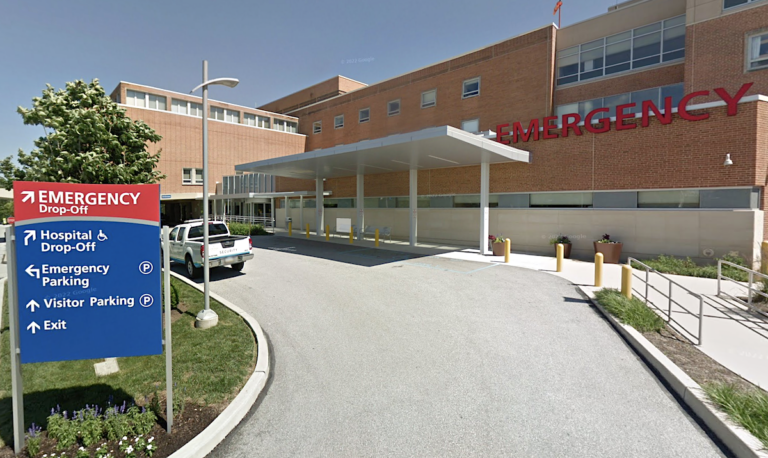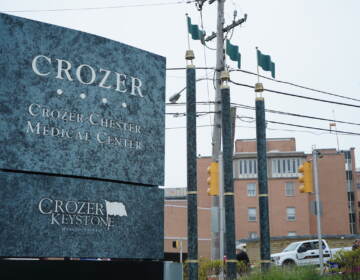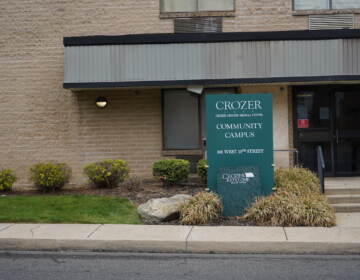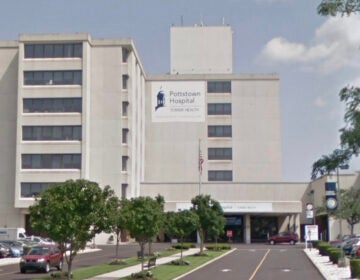Suburban hospitals overwhelmed after Crozer Health shutdowns and Tower Health closures
Hospitals in Delaware, Chester, and even Montgomery counties are feeling the ripple effects of Crozer Health service shutdowns and Tower Health closures.

Riddle Hospital in Media, Pa. (Google Maps)
Got a question about life in Philly’s suburbs? Our suburban reporters want to hear from you! Ask us a question or send an idea for a story you think we should cover.
The electronic warning notifications have been nonstop.
“Capacity alert: Red. High patient volume.”
Jack Lynch, the president and chief executive officer of Main Line Health, interrupted an interview to read aloud the capacity alert facing the hospitals in the system: Riddle Hospital, Bryn Mawr Hospital, Paoli Hospital, and Lankenau Medical Center.
It’s been busy throughout the COVID-19 pandemic, but things have changed, especially at Paoli.
“Paoli for the last six months, for the most part, has been full. I mean, 100% of our beds are occupied and we’re boarding patients in the emergency room — which means patients that are ready to be admitted, are waiting in the emergency room for a bed to be opened up upstairs,” Lynch said.
The emergency department is not overrun with COVID-19 patients. In fact, across the system as of June 3, there were just 40 patients hospitalized due to COVID. The huge influx of patients is because of a lack of space elsewhere. The closures of Jennersville Hospital and Brandywine Hospital, in December and January respectively, were already causing havoc throughout Chester County.
However, the recent service shutdowns within Crozer Health, the struggling four-hospital system in Delaware County, have pushed things over the edge.
Instability in neighboring medical systems has had a domino effect on the remaining suburban hospitals.
“We’re drawing patients north of Paoli from people that historically may have gone to Jennersville or Brandywine and are looking for care at Paoli,” Lynch said.
Over the last few months, Main Line Health has also seen a 16% increase in emergency department visits at Riddle. Lynch attributed it to the service shutdowns that are going on at Crozer.
“Let’s face it, laying on a stretcher, in the emergency room, waiting for a bed upstairs, is very different than being transported upstairs into a patient room that has a bed and a bathroom,” Lynch said.
The emergency room is just the tip of the iceberg. Lynch said that the system’s obstetrics and gynecology departments “are as busy as they ever have been.” Delaware County Memorial Hospital’s maternity unit has been closed since January. Babies that would have been born there are being delivered elsewhere.
Main Line Health’s behavioral health wards are also being overextended.
“We’ve got a behavioral health crisis in this country. We’ve got a behavioral health crisis in this region — and we have a limited number of inpatient beds. And when Brandywine closed that eliminated the [inpatient] mental health beds available in Chester County,” Lynch said.
What Main Line Health is having to do is spend capital to add additional beds and hire more staff to accommodate the increased volume.
Trinity Health Mid-Atlantic and Penn Medicine are facing similar issues
And it’s not just Main Line Health.
Trinity Health Mid-Atlantic, which operates Mercy Fitzgerald Hospital in Darby, is experiencing a near identical crisis because of the Crozer ward closures. A spokesperson told WHYY News in a statement that Mercy Fitzgerald “has seen an increase in patient volume.”
“Having expected many of these regional closures and service reductions, Mercy Fitzgerald has taken steps over the last few months to prepare for the larger role we now have in providing care to those in our community. For example, in our Emergency Department, we went from delivering no babies, as Mercy Fitzgerald Hospital does not have an OB unit, to several deliveries over the last couple months,” the statement read.
Because of the closure of Delaware County Memorial’s maternity unit, Trinity Health Mid-Atlantic is providing specialized training to its emergency department and emergency medical service teams to ensure they are prepared for the “unexpected” — such as the baby deliveries and prenatal care for pregnant patients.
The spokesperson emphasized that although the emergency department may be the entry point for higher patient volumes, almost all of the units within Mercy Fitzgerald have been impacted in some way, shape, or form.
Penn Medicine, which operates Chester County Hospital in West Chester, is not seeing more patients because of Crozer’s instability. However, the Tower Health closures are definitely having an impact, according to a company spokesperson.
“Our Emergency Department has been impacted the most by the closures of Brandywine and Jennersville hospitals, but our recently completed three-year renovation project has increased our bed capacity in the Emergency Department, which has allowed us to meet this demand and continue providing the best possible care for patients,” the statement read.
Main Line Health and Trinity have initiated similar transformations within their hospitals to adjust for the closures.
Despite being overwhelmed by patients, all three of the health systems told WHYY News that the ability to provide adequate care has not been affected.
Are the hospitals keeping an eye on Crozer?
While the Tower Health situation has been at a standstill over the last few months, Crozer Health appears to be hanging on by a thread. When asked if there were any concerns regarding the viability of Crozer, Trinity chose not to weigh in on the specifics.
“On a national level, we are concerned about various changes and consolidation of services occurring in the healthcare industry that make the delivery of care more difficult and reduce options for patients,” the statement read.
Lynch, of Main Line Health, said that Crozer is working hard to meet the needs of the patients in their community and that he wants to be “careful” that he is not criticizing his colleagues in the region.
He emphasized that Crozer serves a large population of people on Medicaid and that they are providing care at cost more than they are getting reimbursed by the government.
“I think what Crozer has found themselves in is a situation where the reimbursement that they’re getting to care for the patient population they’re caring for doesn’t cover their costs. So what’s the first thing you do? You start reducing your costs,” Lynch said.
His main solution? Government relief.
“All of the hospitals in the state of Pennsylvania signed a letter to the Pennsylvania leadership in the congressional delegation seeking support to prevent the 2% sequestration cut and the prospect of a Statutory Pay As You Go Act of a 4% reduction in Medicare,” Lynch said.
However, it is important to note that Crozer largely is not in its predicament because of Medicaid patients and rising care costs. Crozer’s parent company, Prospect Medical Holdings, has a long history of siphoning millions from its hospitals across the country.
Healthcare observers believe the hospital chain’s troubles go back to a business deal that was started in 2019.
The deal was made by Prospect’s previous owner, a private equity firm called Leonard Green & Partners. The firm drained $645 million from Prospect attempting to sell it in October 2019. The transaction would go on to leave Prospect with $1.3 billion in lease obligations.
WHYY is your source for fact-based, in-depth journalism and information. As a nonprofit organization, we rely on financial support from readers like you. Please give today.








